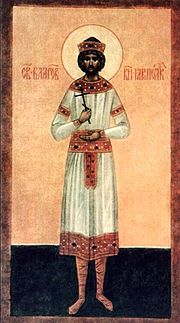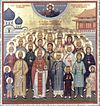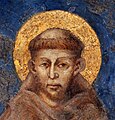
Back Portal:Santos Spanish პორტალი:წმინდანები Georgian Портал:Светци Macedonian Portal:Święci Polish Portal:Santos Portuguese Portal:Saints SIMPLE
|
THE SAINTS PORTAL
Showcased saint-related contentIn Christian belief, a saint is a person who is recognized as having an exceptional degree of holiness, likeness, or closeness to God. However, the use of the term saint depends on the context and denomination. In Anglican, Oriental Orthodox, and Lutheran doctrine, all of their faithful deceased in Heaven are considered to be saints, but a selected few are considered worthy of greater honor or emulation. Official ecclesiastical recognition, and veneration, is conferred on some denominational saints through the process of canonization in the Catholic Church or glorification in the Eastern Orthodox Church after their approval. In many Protestant denominations saint refers broadly to any holy Christian, without special recognition or selection. While the English word saint (deriving from the Latin sanctus) originated in Christianity, historians of religion tend to use the appellation "in a more general way to refer to the state of special holiness that many religions attribute to certain people", referring to the Jewish ḥasīd or tzadik, the Islamic walī/ fakir, the Hindu rishi, Sikh bhagat or guru, the Shintoist kami, the Taoist shengren, and the Buddhist arhat or bodhisattva also as saints. Depending on the religion, saints are recognized either by official declaration, as in the Catholic faith, or by popular acclamation (see folk saint). (Full article...) Selected biography
Yaropolk Izyaslavich (died 1087) was a Knyaz (prince) in eleventh-century Kievan Rus. The son of Grand Prince Izyaslav Yaroslavich by a Polish princess named Gertruda, he is visible in papal sources by the early 1070s but largely absent in contemporary Rus'ian sources until the year of his father's death, 1078. During his father's exile in the 1070s, Yaropolk can be found acting on his father's behalf in an attempt to gain the favor of the German emperors and the court of Pope Gregory VII. Yaropolk followed his father when the latter returned to Kiev in 1077.
After his father's death in the following year, 1078, Yaropolk was appointed Prince of Vladimir-in-Volhynia and Prince of Turov by the new Grand Prince, his uncle Vsevolod. By 1085 however, Yaropolk had fallen into a state of enmity with the Grand Prince and by extension the Grand Prince's son Vladimir Monomakh, forcing him to flee from his principality to his mother's homeland, Poland. He returned in the following year, but was soon murdered. He was remembered in Rus'ian sources as extremely pious and generous to the church, and is recognized as a saint in the Eastern Orthodox Church. He was said to have left all his wealth to the Monastery of the Caves in Kiev. The Primary Chronicle's eulogy is the first indication of saintly regard, and indeed today he is venerated as a saint in the Eastern Orthodox Church, with his feast day falling on the reported day of his death, November 22. Did you know...
Selected saint days
General imagesThe following are images from various saint-related articles on Wikipedia.
CategoriesRelated portalsWikiProjects The Saints Wikiproject aims primarily at standardizing the articles about people venerated by some Christians as saints or the blessed and ensuring quality articles. If there is an interest in including saints from religions other than Christianity, please propose those changes on our talk page. Related topicsSaints: Saint Michael - Saint Gabriel - Virgin Mary - Saint Joseph - Saint John the Baptist - Saint Stephen - Saint Peter - Saint Paul - Saint Augustine of Hippo  Traditions: Calendar of saints - Hagiography - List of saints - Symbology of the Saints Theology: Communion of Saints - Intercession of saints - Martyrs - Patron saint Roman Catholicism: Congregation for the Causes of Saints - Servant of God - Venerable - Beatification - Canonization Muslim Sufi saints: 'Abd al-Qadir al-Jilani - Ahmad al-Rifa'i - Ibrahim al-Disuqi - Ahmad al-Badawi - Al-Shadhili - Baha' al-Din Naqshband - Ibn 'Arabi - Wali Sanga Recognized content
|















